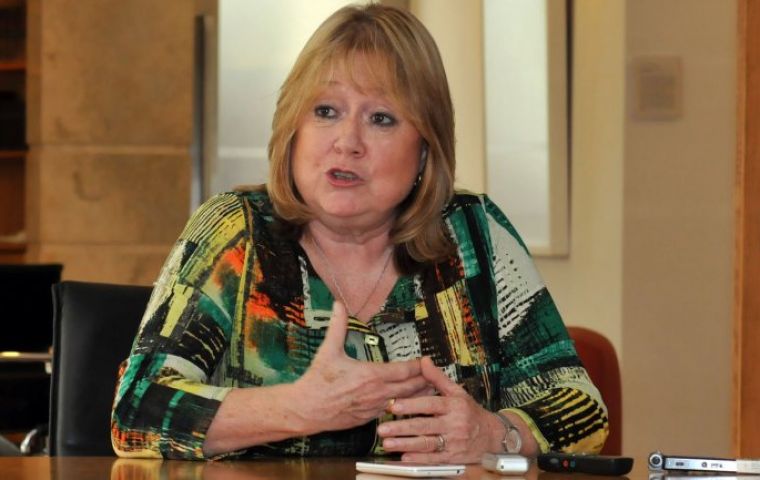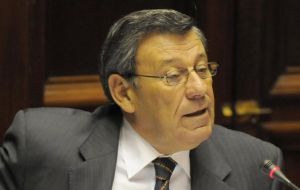MercoPress. South Atlantic News Agency
Argentina and Uruguay praise new spirit in relations and “return to normality”.
 “It was a very cordial meeting that had concrete results,” Malcorra said in an interview with Mitre radio station.
“It was a very cordial meeting that had concrete results,” Malcorra said in an interview with Mitre radio station.  Bilateral relations between Uruguay and Argentina went through “difficult moments” during the previous administration, Nin Novoa underlined
Bilateral relations between Uruguay and Argentina went through “difficult moments” during the previous administration, Nin Novoa underlined Foreign Minister Susana Malcorra said that the meeting between President Mauricio Macri and his Uruguayan counterpart Tabare Vazquez last Thursday symbolized a “return to normality” for bilateral relations between the two neighbours.
“It was a very cordial meeting that had concrete results,” Malcorra said in an interview with Mitre radio station. “President Macri abolished the decree that stated there could not be transshipment in Uruguayan ports (of Argentine exports), which placed limits on Uruguay and made it more complicated for us. We agreed to work on a bi-national plan for ports.”
Malcorra’s Uruguayan counterpart, Rodolfo Nin Novoa, also praised the bilateral meeting and expressed the optimism that a new era of relations was opening between the two countries.
“Incredibly, it was the Kirchner government that put all the difficulties that we currently have,” Nin Novoa said in an interview with FM Milenium radio. “The truth is that this thing about ideologies is sometimes contradicted by the willingness of governments to face up to problems in a realistic and pragmatic fashion.”
Bilateral relations between Uruguay and Argentina went through “difficult moments” during the previous administration, Nin Novoa added.
Malcorra said that the Macri administration would pursue more direct talks with Mercosur trade bloc members to try to figure out how bilateral relations can improve.
“The Mercosur is important and within the Mercosur we must find niches to complement ourselves with our neighbors,” Malcorra said. “We are doing it with Uruguay and there are opportunities with Paraguay as well.”
Macri’s next tours abroad include his trip to Switzerland for the World Economic Forum in Davos as well as a stop in Ecuador.
“We have developed a platform to present Argentina to the world,” Malcorra said. “There are requests for bilateral interviews with other heads of state and within the private sector there is also a great desire to understand what will be the position of this administration. We hope that can help us get concrete results in attracting investments.”
The commercial tensions between Buenos Aires and Montevideo were not just about the transshipment rules imposed by former president Cristina Fernandez de Kirchner, but also the limits on imports that essentially prevented many Uruguayan products from entering Argentina.
“I want to highlight the climate in which this meeting was carried out. It really was very positive and there was lots of openness, comprehension and a clear desire to resolve the issues,” Nin Novoa said.
Uruguay’s foreign minister said that the Vázquez’s government saw it as very positive that Macri decided to abolish the decree that had limited transshipment in Uruguayan ports.
“That a president would come with a concrete solution brought us a great level of satisfaction,” he said.
Cristina Fernandez administration approved the measure that prohibited transshipments in Uruguayan ports in October 2013, a time of high tensions between the two neighbors as the government in Montevideo had approved an increase in production for the UPM pulp mill — formerly known as Botnia.
The US$1.2 billion Finnish-owned pulp mill soured relations between the neighboring countries since before it opened in 2007, but the world court in The Hague said in 2010 that it could keep operating. Protesters had blocked a border bridge for years trying to get the plant shut down due to environmental concerns.
In April 2014, then-Foreign minister Hector Timerman said Argentina was ready to take Montevideo back to the International Court of Justice (ICJ) over the increased output.




Top Comments
Disclaimer & comment rules-

-

-

Read all comments,does the mighty Hepatia
Jan 11th, 2016 - 02:35 pm 0think Uruguay will be returned to Argentina also,
just saying..
'Return to normality' ??
Jan 11th, 2016 - 03:48 pm 0In Argentina, there is no “normality” to return to. Even the term Argentina is a local mispronunciation of the word Anormalidad.
GOLLUM never had any intention of taking us to the ICJ it was just his usual smokescreen otherwise why has nothing happened since April 2014?
Jan 11th, 2016 - 05:43 pm 0Good news on the lifting of the transhipments ban but when are they going to pay for the three years electricity they had via the sub-Plate cable?
Commenting for this story is now closed.
If you have a Facebook account, become a fan and comment on our Facebook Page!